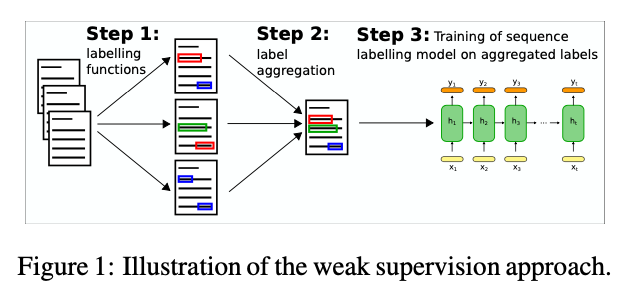Manual annotations are expensive and they are usually limited to a certain domain. The performance of NER taggers often rapidly degrades when applied to a different domain. What if not a single bit of annotated data is available? In this paper, the authors present a cold start method for NER without labelled data.

They designed several labelling functions, which can be an existing tagger or some rule-based systems like a gazetteer, to generate silver labels. These functions are noisy, so they propose a clever way to aggregate the noisy annotations. Their aggregation is a HMM, in which the states are true labels and emissions are silver labels from each labelling function. This HMM is trained with Baum-Welch algorithm, which is a variant of EM algorithm. To make use of the aggregated annotations, CE loss of the prediction and probabilistic annotations are applied.
Their F1 on CoNLL03 is over 71% which is promising given that no gold data is used.
Overall Recommendation
- 5: Transformative: This paper is likely to change our field. It should be considered for a best paper award.
- 4.5: Exciting: It changed my thinking on this topic. I would fight for it to be accepted.
- 4: Strong: I learned a lot from it. I would like to see it accepted.
- 3.5: Leaning positive: It can be accepted more or less in its current form. However, the work it describes is not particularly exciting and/or inspiring, so it will not be a big loss if people don’t see it in this conference.
- 3: Ambivalent: It has merits (e.g., it reports state-of-the-art results, the idea is nice), but there are key weaknesses (e.g., I didn’t learn much from it, evaluation is not convincing, it describes incremental work). I believe it can significantly benefit from another round of revision, but I won’t object to accepting it if my co-reviewers are willing to champion it.
- 2.5: Leaning negative: I am leaning towards rejection, but I can be persuaded if my co-reviewers think otherwise.
- 2: Mediocre: I would rather not see it in the conference.
- 1.5: Weak: I am pretty confident that it should be rejected.
- 1: Poor: I would fight to have it rejected.
